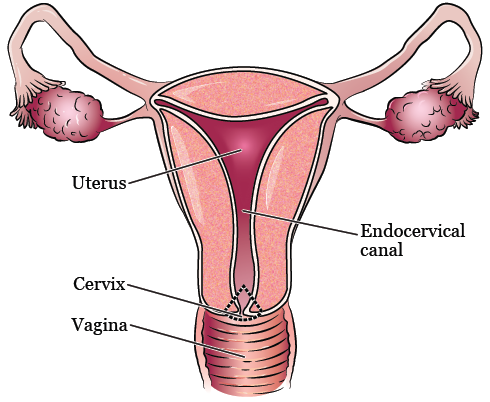This information describes what to expect during and after your colposcopy.
A colposcopy is a procedure that examines your cervix, which is located at the end of your uterus. This procedure is done to get a close-up look of your cervix to check for cancer.

Figure 1. Female anatomy
During your colposcopy, your doctor will use a tool called a colposcope. This tool is like a magnifying glass for your cervix and will help your doctor find any signs of cancer.
Your doctor may also do a biopsy. This means they will take a small sample of tissue from your cervix. You may also have another type of biopsy done called an endocervical curettage (ECC). During an ECC, your doctor will remove cells from the lining of your endocervical canal (canal that goes from your cervix to your uterus).
Your doctor will send the samples to a lab to be checked for cancer.
The procedure usually takes about 20 minutes.
Before Your Procedure
Schedule your procedure for 1 week after your period.
The day before your procedure, do not:
- Have vaginal intercourse.
- Put anything in your vagina, including douches and tampons.
- Use any vaginal creams or medications.
During Your Procedure
- You will lie on your back with your feet in stirrups. This is the same position you’re in for your routine pelvic exams.
- Your doctor will put a speculum into your vagina. This is an instrument that will gently spread apart your vaginal walls so that your doctor can see your cervix.
- Your doctor will wash your cervix with a mild vinegar solution. This will clear any mucus on your cervix and make it easier to see any abnormal cells.
- Then your doctor will then examine your cervix using the colposcope.
- If your doctor performs a biopsy, you will feel some discomfort as the tissue is removed.
- If your doctor performs an ECC, you will feel mild cramping.
After Your Procedure
If you had a biopsy or ECC:
- You may have a bloody or brownish-black vaginal discharge for a few days. Use sanitary pads for vaginal discharge. Do not use a tampon.
- Take acetaminophen (Tylenol®) or ibuprofen (Advil®) for any discomfort.
-
For 1 week after your procedure, or as instructed by your doctor, do not:
- Have vaginal intercourse.
- Put anything in your vagina, including douches and tampons.
- Use any vaginal creams or medications.
- Call your doctor’s office 1 to 2 weeks after your procedure for your biopsy results.
Call Your Doctor or Nurse if You Have:
- A fever of 101° F (38.3° C) or higher.
- Vaginal discharge lasting more than a few days.
- Vaginal bleeding that is heavier than your menstrual flow.
- Pain that doesn’t get better with over the counter pain medication.
- Any unexpected problems.